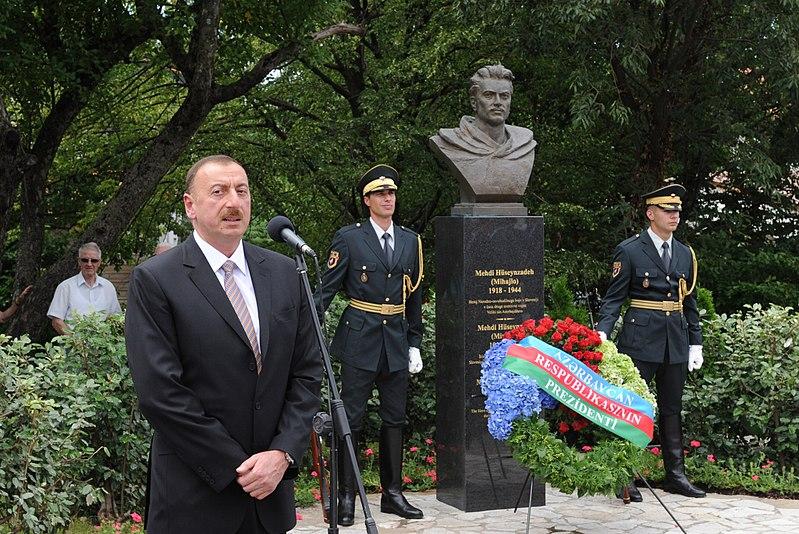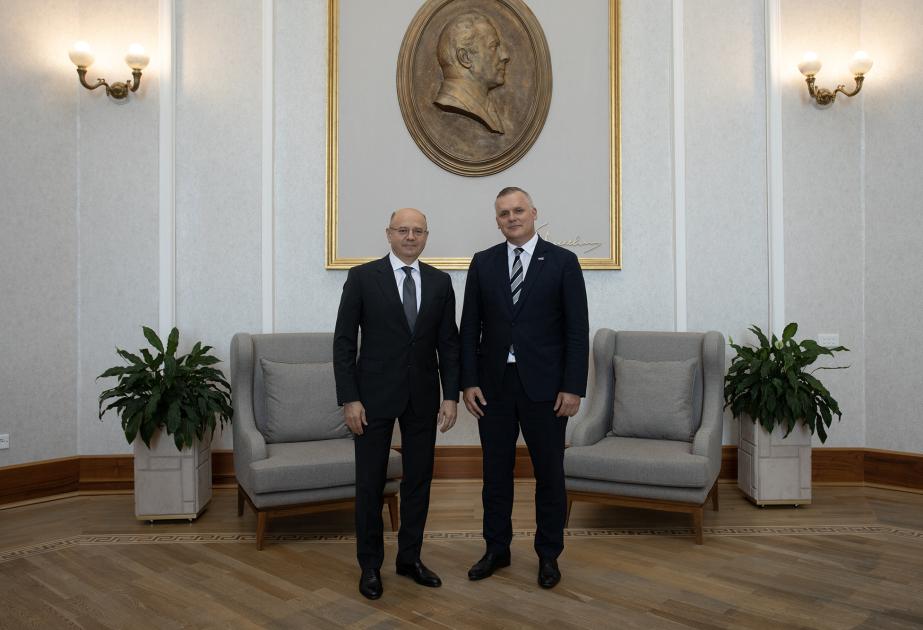Azerbaijan-Slovenia ties get gas boost: New pipeline, green energy on horizon Caliber.Az review
In recent years, Azerbaijan has been actively expanding its economic ties with countries in Southern and Eastern Europe through the "Southern Gas Corridor" (SGC) project and future partnerships for exporting "green" electricity. Concurrently, Azerbaijan aims to enhance cooperation in the non-oil sector, increase trade relations, and develop investment opportunities with the Balkan region, including Slovenia.
During a recent visit to Baku by Slovenian Minister of Environment, Climate, and Energy, Bojan Kumer, a memorandum of understanding was signed to broaden cooperation in gas supply. Discussions also covered prospects for collaboration in alternative energy and included an exchange of views on organising the UN COP29 conference.
Since the establishment of diplomatic relations on February 20, 1996, cooperation between Baku and Ljubljana has been built on a strong foundation of mutual respect and partnership, including collaboration within international organizations. Both countries adhere to similar positions on fundamental principles of international law and mutual respect for sovereignty. Additionally, significant moments in 20th-century history have closely linked the two nations.
During World War II, Slovenian patriots and Azerbaijani soldiers displayed great bravery. Symbolically, in June 2011, a memorial museum was opened in the Slovenian city of Nova Gorica, dedicated to the heroism of Azerbaijani hero and partisan Mehdi Huseynzade—also known as Mihajlo. The opening ceremony was attended by Azerbaijani President Ilham Aliyev, commemorating their courage in the fight against fascism.

The shared political and humanitarian positions, coupled with the business communities' drive for mutually beneficial cooperation, have laid the foundation for the current economic initiatives between Azerbaijan and Slovenia. To date, around 12 intergovernmental and interstate agreements have been signed between the two countries, facilitating the development of trade relations. To further expand trade and economic ties, cooperation has been established between the Azerbaijan Export and Investment Promotion Agency (AZPROMO) and the Slovenian Public Agency for Entrepreneurship, Innovation, Development, Investment, and Tourism (SPIRIT Slovenia).
According to information the Azerbaijan Ministry of Economy provided to Caliber.Az, Slovenian companies operate in Azerbaijan across various sectors, including industry, trade, and services. To optimize these activities, a bilateral Convention for the Avoidance of Double Taxation on Income and Property was signed in 2011.
Bilateral trade primarily involves the import of pharmaceutical products, vehicles and their parts, ferrous metallurgy products, and equipment from Slovenia. Additionally, there are smaller quantities of food and consumer goods imported. On the other hand, Azerbaijan exports mainly oil products, polymers, methanol, tar oils, and other petrochemical products, including urea fertilizers. Azerbaijani exports also include aluminium and its products, mechanical devices, gold concentrate, fruits and vegetables, animal products, oils, cotton fibre, and both alcoholic and non-alcoholic beverages.
Remarkably, both countries have achieved significant success in certain areas of their trade portfolio recently. Last year, Slovenia ranked among the top three suppliers of pharmaceutical products to Azerbaijan within the European Union, alongside Germany and Hungary. Slovenian pharmaceutical companies exported 397 tonnes of medications to Azerbaijan, amounting to 18.7 million euros, reflecting a 6.3 per cent increase in value.
Conversely, in 2023, Slovenia became one of the top five EU countries importing the highest quantities of nitrogen fertilizers produced by the SOCAR Carbamide Plant in Sumgayit. These imports totalled 4.8 thousand tons, valued at 1.8 million euros.
The two countries have a long and successful cooperation in the field of telecommunications and cyber security. Over a decade and a half ago, Slovenian company Iskratel participated as an equipment supplier and system integrator in the projects of the Ministry of Communications of Azerbaijan Republic on the digitalisation of communication systems of Baku, Sumgayit, transfer of telephone exchanges to the Next Generation Network (NGN) technology. Iskratel's participation in Aztelecom's large-scale projects helped create high-speed data transmission networks in Shamakhi district and Khirdalan on the basis of PBX 442, thanks to which more than 45,000 subscribers of the capital's suburbs got access to high-speed broadband Internet. In the following period, Iskratel LLC specialists took part in the development of cyber security systems for the leading Azerbaijani cable operator Delta Telecom.
Unfortunately, the scale of Azerbaijan-Slovenia trade and investment cooperation cannot be called significant, especially when compared to the trade turnover and business integration with neighbouring countries - Bulgaria, Serbia, Romania, Hungary, Croatia and Slovakia. However, the trade relations developed between Baku and Ljubljana should be recognised as steadily growing: thus, if in 2020 the trade turnover between the countries exceeded $20.705 million, by the end of 2023 the corresponding indicators reached almost $40 million.
However, the bilateral trade and economic ties between the two countries will soon be given a new impetus. This is evidenced by the signing last Wednesday of a memorandum of understanding between the State Oil Company of Azerbaijan (SOCAR) and Slovenia's largest natural gas supply company Geoplin to expand cooperation in the field of gas supplies. In the course of negotiations, SOCAR President Rovshan Najaf and Slovenian Minister of Environment, Climate and Energy Bojan Kumer, who signed the document, noted the successful development of Azerbaijani-Slovenian cooperation in the energy sector and emphasised the existence of considerable potential for cooperation in the field of natural gas supplies.
"Slovenia and Azerbaijan may sign a gas supply contract in the coming weeks. It is extremely important for us to secure gas supplies from different sources, to diversify the supply of natural gas, because Slovenia is completely dependent on imports from other countries for gas," Minister Bojan Kumer said during his visit to Baku. - Azerbaijan, which is rich in gas reserves, represents an important opportunity to diversify our gas supplies, which is a natural choice for us. I am very pleased that we have signed a Memorandum of Understanding between SOCAR and Geoplin, which is supported by both governments, and this was a key step towards concluding a contract between the two companies".
According to preliminary estimates by Slovenian experts, the expected volume of gas from Azerbaijan in the first phase will be about 0.3 billion cubic metres per year. The supply route will pass through Italy and work is currently underway to increase the capacity of the cross-border pipeline, which will be completed tentatively in 2025. In the longer term, the supply of Azerbaijani gas to the Slovenian market could increase significantly with the commissioning of the prospective four-country Ionian-Adriatic Pipeline (IAP). Designed to carry 5 billion cubic metres of gas per year, the IAP segment will be connected to the Trans Adriatic Pipeline (TAP) and will run north through Albania to Montenegro, then Croatia and probably Slovenia.

Cooperation between Baku and Ljubljana in the field of renewable energy sources (RES) looks very promising, and it is relevant to note here that Slovenia is the EU's largest producer of solar panels and one of the largest suppliers of water turbines for hydropower plants in the Europe region. "We welcome all Azerbaijan's initiatives for future cooperation in the RES sector, and Slovenian equipment manufacturers in the green energy segment are offering their know-how, services and support for the introduction of these technologies within the framework of projects implemented in Azerbaijan," Tina Sersen, State Secretary for Energy at the Slovenian Ministry of Environment, Climate and Energy, said recently.
In turn, according to Minister Bojan Kumer, the Azerbaijan-Slovenian dialogue in the preparations for the 29th session of the Conference of the Parties to the UN Framework Convention on Climate Change (COP29) to be held in Baku is seen as very successful. "During my meeting with Mukhtar Babayev, Minister of Ecology and Natural Resources of Azerbaijan and President of COP29, I was informed that the preparations are progressing very well. I offered him and his team any assistance from our side: the Slovenian team is fully prepared to constructively participate in the negotiations and political initiatives and contribute to the successful outcome of Azerbaijan's COP chairmanship," Kumer emphasised.








